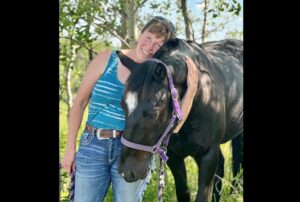No one likes to be told, “Hey! You need to change your attitude!” But that bitter pill is much easier to swallow when it’s administered by a horse.
Cheralyne Gibson is horsemanship director at the Valley Equestrian Centre, a ministry of Youth Farm Bible Camp, which is owned by Mennonite Church Saskatchewan. Not only is she a certified riding instructor, Gibson is also a trained facilitator in equine-assisted learning (EAL).
She describes EAL as “using horses to teach life skills.” It’s built on a curriculum that contains upwards of 40 sessions. Each session has an objective related to a life skill such as trust, problem solving, anger management or communication. And while each session can stand alone, Gibson encourages participants to sign up for a minimum of six sessions. The facilitator selects the objectives based on participants’ needs.
In a typical EAL session the facilitator works with two participants and one horse, leading them through a series of tasks to achieve the desired objective. Tasks might include working together to lead a horse through an obstacle course. The facilitator observes the human participants as well as the horse, watching for signs that a participant may be struggling. Open-ended questions allow participants to discover the nature of the problems and address them with changed behaviours.
The horse’s behaviour can signal distress. “Because horses are prey animals, their senses are keen,” says Gibson. “They are always observing their environment for any perceived threat.” She notes that horses are sensitive to human emotions such as anxiety or anger.
Gibson recalls hearing about a youth who participated in an EAL program. During the session one horse kept nuzzling the youth and staying close beside him, behaving like a mare with a foal. The facilitators later learned that the youth’s mother had abandoned him.
Not every horse is a good candidate for EAL. Gibson says, “We have to be able to trust that no matter the situation the horses will keep the [participants] safe.” They also have to have what she calls “a forgiving personality.” Older horses that are used to being handled are often good EAL teachers.
Mark Wurtz, Youth Farm’s executive director, points out that humans have a long history with horses and that their size alone commands respect. “Using the horse’s voice can be more direct,” he says.
Gibson adds, “It’s easier to take constructive criticism from a horse.”
Youth Farm is partnering with schools to provide EAL for at-risk children and youth. Wurtz is also developing a connection with Mennonite Central Committee Saskatchewan, to provide EAL for inner-city youth through its Appleby Kids and Youth Clubs.
But EAL isn’t only for troubled youth. Gibson says it’s an excellent tool for leadership training and team development. In an activity called “Crossing the river,” for example, five participants are tasked with moving themselves, the horse and all of their gear across an imaginary river without touching the piranha-infested water. The objective is to work together as a team to solve the problem. “It’s about personal development,” she says, “but it’s lots of fun, and we try to keep it light and positive.”
The results can be quite dramatic. Gibson remembers one young participant who, at the end of his first session, said, “Today I was able to trust the horses and I’ve never been able to trust humans.”
In another session she worked with two adult co-workers with very different personalities. “One was a leader, the other one held back,” she says. “The objective of the lesson was teamwork, but it wasn’t working. The horse was confused and agitated because it was receiving mixed signals.” Gibson and the participants were able to address this, and two months later the more-reserved participant reported that the working relationship with the other individual had improved from that moment on.
EAL sessions, as well as group and individual riding lessons, take place in Youth Farm’s recently constructed riding arena. Wurtz says the camp had been dreaming of building an arena for about 20 years. While horses have always been a component of summer camp, the arena will allow programming to continue year-round.
Gibson appreciates the opportunity to do the work she loves in a Christian setting. “Working at the Youth Farm, I can talk about being a Christian, whereas in secular organizations, you’re not allowed to talk about it,” she says. “I want people to know I’m a Christian and that I’m doing this because I care about people.”
She also notes, “I find it interesting that the more you acquire Christ-like ways of being, the better you are with horses.”









Leave a Reply
You must be logged in to post a comment.